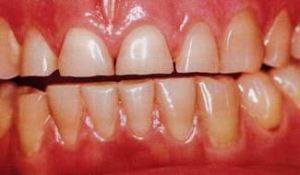 In fact, a decent part of the world's population suffers from such an unpleasant phenomenon as grinding teeth during sleep (bruxism). Moreover, this phenomenon does not bypass anyone, it is inherent in both adults of both sexes and children.
In fact, a decent part of the world's population suffers from such an unpleasant phenomenon as grinding teeth during sleep (bruxism). Moreover, this phenomenon does not bypass anyone, it is inherent in both adults of both sexes and children.
Naturally, the question arises, what causes the nighttime squeak of teeth? And does it not entail any negative consequences?
Content
- Causes of pathology in adults
- The danger of bruxism
- Possible Symptoms
-
How to get rid of squeaky teeth
- Relaxation of the jaws
- Overvoltage control
Causes of pathology in adults
The main and most common reason why people grind their teeth in their sleep is of a psychological and neurological nature. A person experiences during the day negative emotions: anger, irritation, anger, sometimes even hatred. At the same time, the nervous system is depleted, without proper psychological discharge, the body experiences powerful emotional overload. Someone periodically falls into a depressive state, suffers from increased anxiety, various phobias.
 All of these factors, alone or in combination, can lead to teeth grinding. If a person during the day behaves with sufficient restraint, does not give way to emotions, then he constantly accumulates nervous tension. Because of this, during sleep, the muscles of the face tense, from which a person chatters his teeth.
All of these factors, alone or in combination, can lead to teeth grinding. If a person during the day behaves with sufficient restraint, does not give way to emotions, then he constantly accumulates nervous tension. Because of this, during sleep, the muscles of the face tense, from which a person chatters his teeth.
The second assumption about the causes of teeth creak is based on sleep phase change disorders, the wrong course of the deep period and the superficial.
It is believed that teeth grinding can be inherited from parent to child. If the father or mother suffered from this, then it is likely that a similar fate awaits the children.
 Chronic lack of sleep, systematic fatigue can also be the causes of this phenomenon. What does it mean? The muscles are unable to relax even during rest, due to their tension, a creak occurs.
Chronic lack of sleep, systematic fatigue can also be the causes of this phenomenon. What does it mean? The muscles are unable to relax even during rest, due to their tension, a creak occurs.
Substance abuse that overstimulates the body can cause teeth grinding. These include coffee, nicotine, alcohol, energy drinks, and other drugs.
The danger of bruxism
Grinding occurs as a result of the very tight squeezing of the jaws and the friction of the upper and lower teeth against each other. With frequent bruxism, the chewing elements experience constant stress at night and over time this brings them considerable harm.
- With chronic grinding, tooth enamel begins to wear off. As a result, their increased sensitivity and high probability caries development;
-

Teeth with bruxism
Gradual decay of teeth begins, loosening, appearance in them cracks;
- If a person has any dentures, then with teeth grinding at night, their service life is significantly shortened;
- Constant muscle tension and clenching of the jaws over time can lead to diseases of the temporomandibular joint, such as arthritis and even arthrosis. With the development of these diseases, a person feels constant pain and not only at night;
- The likelihood of spasms of the muscles of the face and jaws increases;
- Grinding teeth leads to poor sleep and regular sleep deprivation.
Possible Symptoms
Most often, a person may not even suspect for a long time that he makes any sounds at night. Usually people learn about this "habit" from their loved ones when the wife starts complaining that the husband grinds his teeth at night. But there are several symptoms by which you can independently recognize the presence of bruxism:
-
 any changes in the appearance and shape of the dentition;
any changes in the appearance and shape of the dentition; - soreness in the area of the inner surfaces of the cheeks or tongue due to night biting;
- the appearance of clicks in the jaw joint and loosening of the teeth;
- the occurrence of headaches, jaw pains, ear pains, as well as temporomandibular or spinal anomalies;
- sudden migraines and dizziness;
- sleep disturbance, the appearance of insomnia, unreasonable and unreasonable depression.
How to get rid of squeaky teeth
The first thing to do when signs of bruxism appear is to consult a specialist. Only a doctor can advise how you can get rid of this unpleasant phenomenon.
Relaxation of the jaws
If a person suffering from a squeak in the daytime often clenches his jaw and is in this state for a long time, then he needs to learn how to relax the jaw joint. What can you do to relax your muscles?
-
 The "fatigue" of the jaws during wakefulness can help, namely, chewing solid food: apples, crackers, dryers, and so on;
The "fatigue" of the jaws during wakefulness can help, namely, chewing solid food: apples, crackers, dryers, and so on; - During the day, you need to constantly monitor so that the jaws do not clench. This should only happen with meals;
- A warm compress applied to the temporomandibular region has an excellent relaxing effect. To do this, wet the towel with warm water, place it in the desired area of the face and lie down with it for a while at rest;
- Wearing a mouthguard also helps your jaws to relax and get used to being in the right position.
Overvoltage control
In dealing with persistent overvoltage, the following can help:
- You need to exclude energy, invigorating and stimulating ingredients from your diet: coffee, strong black tea, energy drinks, nicotine, alcohol. In addition, sugar intake should be kept to a minimum. All this gives the body additional energy, and in order to get rid of it, a person grinds his teeth in a dream;
-
 Warm baths with soothing aromatic oils and herbs help to calm and relax. decoction of chamomile or lemon balm, green tea or light sedatives: valerian, motherwort in tablets or in the form tinctures;
Warm baths with soothing aromatic oils and herbs help to calm and relax. decoction of chamomile or lemon balm, green tea or light sedatives: valerian, motherwort in tablets or in the form tinctures; - It is necessary to stop the constant overvoltage. All work should be carefully redistributed so that there are no rush jobs, work in a calm, measured rhythm;
- If possible, eliminate strong irritants from your daily life that cause constant stress or tantrums.
Although bruxism at first glance does not look so frightening, it requires indispensable treatment. Left unattended for a long time, it can cause significant harm to human health. If you cannot get rid of the grinding teeth on your own, then you should definitely consult with a specialist.
For some tips on how you can fix the situation, see the following video:
The site is for informational purposes only. Do not under any circumstances self-medicate. If you find you have any symptoms of illness, contact your doctor.
